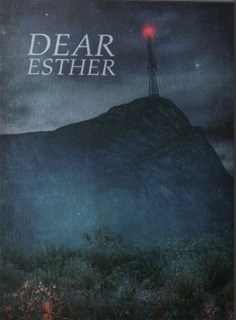An absolute triumph of graphic storytelling and poetic exploration
I first heard of Dear Esther a couple years ago, when someone told me about the Half Life 2 mod by the same name. It had gained significant traction because it took a lot of chances and acted as a story unto itself, which was fresh and interesting.
Which brings me to my verdict on the version released today on Steam.
Absolutely mesmerizing.
It's not really a game... so don't go into it expecting a grand and epic adventure or exciting combat or anything like that. You will be sorely disappointed. This game has no combat system, no inventory, no running, and no jumping. You meander about the island at a brisk but relatively slow pace.
At first, I thought this would be infuriating, but I quickly understood the design choice. The game looks absolutely unbelievable. Skyrim meets Alan Wake. The island itself is one of the biggest reasons to continue onward. Everything looks absolutely real. The sheer amount of vegetation on the pathways is so mind-boggling and gives some of the game's environments the exact windswept English Atlantic island look that the devs were obviously going for. The graphics aren't perfect, as most of the vegetation is one-sided sprites that always face directly at you, which leads to flat plants making quick 180 degree turns as you walk over them, but if you can suspend that part of your brain, you'll be awestruck. There were multiple times in the game where I put the controls down and just sat there in awe at what I was seeing. You don't get that much these days.
The audio is just divine. Everything sounds exactly like I want it to, and it works perfectly. The wind sounds windy, the water sounds just perfect, and the music has a way of rising and falling like the island's tides. The music feels almost eerily appropriate, with tender pianos and creepy strings.
The game is essentially an interactive poem. You start on a cement dock outside a lighthouse, and the game leaves everything up to you. Of course, the experience is very linear, but it's up to you to determine the path. The graphics make the slow-paced exploration a constant joy, but what really brings the exploration to the forefront is the brilliantly-written poetic narration that accompanies the game. When you reach a certain area or section of path, the game will queue a short poem read by a wonderfully-voiced narrator. I don't want to give too much away, but I will say that the game is steeped in metaphor, and it will certainly get you thinking if you give the experience a chance.
In the end, whether or not you like this game is largely dependent on what you consider fun and interesting. If you need combat and frenetic action, then look elsewhere. This game has exactly zero of that, and you'll probably hate it. If you're like me, and you like a plot that makes you think, sublime graphics and audio, gorgeous themes, and a thought-provoking premise and conclusion, then Dear Esther is a must-buy. I have played through the two-hour journey twice already today. It's about the length of a long movie, for about the same price. If you want to experience something truly different that pulls at your heart strings and makes you cock your head to the side and ponder out loud about symbolism, Dear Esther belongs in your Steam Library.

